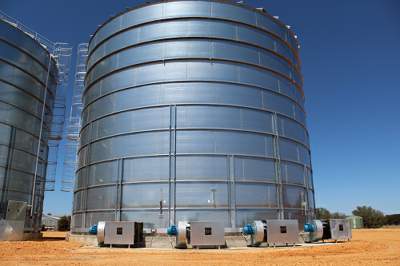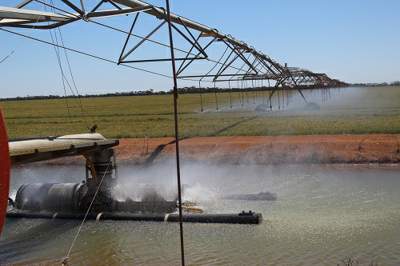Ben Leversha kicked off a career in farming with a ute, a shovel and enough wheat bags to sow just 30ha – today he is a State champion in the Rural Water Awards for the innovative irrigation practices he has brought to his large Loddon Valley cropping property.
Goulburn-Murray Water (GMW) encouraged Ben to nominate for the prestigious statewide awards earlier this year. He was named a regional winner in the Irrigation District Water Users category in October and at a gala award presentation in Melbourne on Friday (November 9), topped the state.
“Ben purchased the property in 2007 and has completely transformed it, moving from flood irrigation to using highly efficient lateral irrigators,” GMW Customer Relationship Consultant Malcolm Pearson said.
“It is a brilliant example of water efficiency.”
Ben, originally from Bendigo and with a background in transport and logistics, had to pick things up quickly and continually learn along the way after embarking on farming at Barraport West, at the far end of the Waranga Western Channel.
He originally ran the business on his own and spent most of his time tied to the property. He is now able to employee three full-time staff and enjoy a work life balance with his wife Brodi and two daughters, Abby aged 5 and Lucy 3.
In the first year of owning the property he watered 30ha armed with his ute and shovel; he didn’t even own a tractor. In the second year he expanded his irrigation footprint to 70 hectares and purchased a tractor, then 100ha for the third year and double that in the fourth.
He had zero re-use and zero water efficiency. By 2013, he realised that he was being let down by his lack of control over water.
“I knew I needed to make improvements to my irrigation infrastructure and thought if I’m going to spend money on bay outlets, then why not put that investment to better use and look at the alternatives,” Ben said.
Half the cost of his two 800-metre lateral irrigators were covered by an on-farm efficiency grant through the Department of Environment, Land, Water and Planning (DELWP).
These irrigators travel an astounding five kilometres before they make the trek back to the starting point. Ben can control the speed of the irrigators from the palm of his hand using his mobile phone and is immediately notified of any issues day or night.
It takes each lateral irrigator 96 hours - or four full days - for the 520 sprinkler heads to deliver the equivalent to an inch of rain.
To gain even more control over his water availability, Mr Leversha constructed a 300-megalitre dam on the property to provide protection from supply issues. The dam stores the equivalent of 10 days’ irrigation water that can be used immediately if required.

One silo takes around six litres of diesel to dry per tonne.

A highly efficient lateral irrigator delivering much needed 'rainfall'.
Ben is now producing 2.5 tonnes per megalitre of water use and is aiming to increase this to three tonnes.
To supplement his irrigation efficiencies, Ben also invested in two large drying silos which allows the property to double crop – producing two crops on the same land in the same year.
The drying silos mean that the crop is able to be harvested at a due date, rather than having to wait for the season conditions to be perfect.
“The crop can be stripped with a higher moisture content and dried later,” he said.
“The drying fans start automatically when required, as the sensors monitor the moisture content of the crop contained in the silo.
“There are air vents in the base of the silo, and an opening at the top to allow for the moisture rich air to leave the drying silos – similar to how a clothes dryer works.
“I can harvest my barley crop on one day and three days later I can be sowing corn in the same footprint.”
Crop types to date have included corn, chickpeas, lentils, canola, barley, wheat and more recently sunflowers.
Ben said his farm operations are, at the end of the day, simple: “My crops are a mirror image, just add diesel and water.”
“You are only limited by your own barriers. I am my own boss and all the decisions lay with me. It’s very liberating.”
The Rural Water Awards are held every two years to reward Victorians who have developed or adapted clever ideas to better use water, deliver water savings, or drive productivity for their business. They are a partnership between VicWater, Goulburn-Murray Water, Southern Rural Water, Lower Murray Water, Grampians Wimmera Mallee Water and Coliban Water.
ADDITIONAL POINTS OF INTEREST
- Ben first contacted Customer Relationship Consultant, Malcolm Pearson, from GMW’s Pyramid Hill Office when he was looking into his water use licence. This is when they discovered he would need to bring some of his land back into the Goulburn Murray Irrigation District. Once Malcolm knew more about Ben’s plans for the property he realised Ben would need more delivery shares to avoid paying the higher casual use fees.
- This proved difficult as the system was already at capacity at that end of the Waranga Western. They managed to negotiate some short term leasing options from neighbouring properties and are working on a longer-term solution is yet to be realised.
- Ben’s one irrigation outlet used over 3300 ML last year and one of his irrigations lasted 90 days and 90 nights.
- There are 520 sprinkler heads on each lateral irrigator. Ben says cleaning them is always a “fun” summer job and goggles are a must as the sprinklers are at head height.